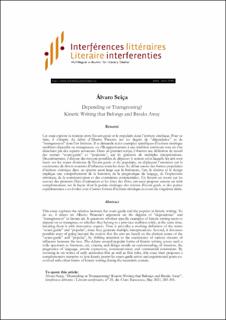| dc.contributor.author | Seiça, Álvaro | |
| dc.date.accessioned | 2021-11-01T08:41:14Z | |
| dc.date.available | 2021-11-01T08:41:14Z | |
| dc.date.created | 2021-10-28T11:15:21Z | |
| dc.date.issued | 2021 | |
| dc.identifier.issn | 2031-2970 | |
| dc.identifier.uri | https://hdl.handle.net/11250/2826736 | |
| dc.description.abstract | This essay explores the relation between the avant-garde and the popular in kinetic writing. To do so, it draws on Alberto Pimenta’s argument on the degrees of “dependence” and “transgression” in literary art. It questions whether specific examples of kinetic writing seem to depend on or transgress, or whether they belong to a previous tradition while, at the same time, breaking from it with innovative aspects. First, it provides a working definition of the terms “avant-garde” and “popular”, since they generate multiple interpretations. Second, it discusses possible ways of going beyond the notion that the arts are based on the distinct zones of the “avant-garde” and “popular”, by shifting attention to the coexistence of various streams of influence between the two. The debate around popular forms of kinetic writing across such a wide spectrum as literature, art, cinema, and design entails an understanding of function, the pragmatics of language, artistic expression, communication, and commercial constraints. By zooming in on works of early animation film as well as film titles, this essay then proposes a complementary narrative to how kinetic poetry by avant-garde artists and experimental poets coevolved with other forms of kinetic writing during the twentieth century. | en_US |
| dc.language.iso | eng | en_US |
| dc.publisher | KU Leuven / Université catholique de Louvain | en_US |
| dc.rights | Navngivelse-Ikkekommersiell 4.0 Internasjonal | * |
| dc.rights.uri | http://creativecommons.org/licenses/by-nc/4.0/deed.no | * |
| dc.title | Depending or Transgressing? Kinetic Writing that Belongs and Breaks Away | en_US |
| dc.type | Journal article | en_US |
| dc.type | Peer reviewed | en_US |
| dc.description.version | publishedVersion | en_US |
| dc.rights.holder | Copyright 2021 the author | en_US |
| cristin.ispublished | true | |
| cristin.fulltext | original | |
| cristin.qualitycode | 1 | |
| dc.identifier.doi | 10.5281/zenodo.5596402 | |
| dc.identifier.cristin | 1949198 | |
| dc.source.journal | Interférences littéraires | en_US |
| dc.source.pagenumber | 283-305 | en_US |
| dc.identifier.citation | Interférences littéraires. 2021, 25, 283-305. | en_US |
| dc.source.volume | 25 | en_US |

